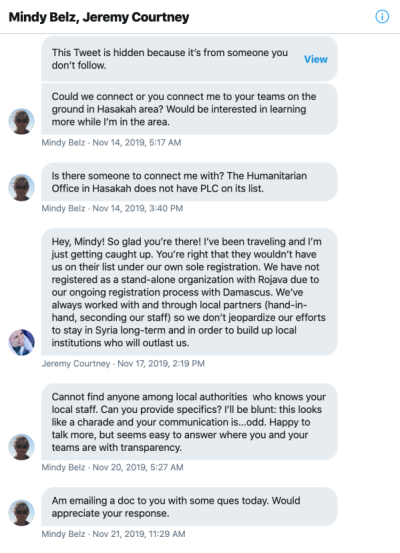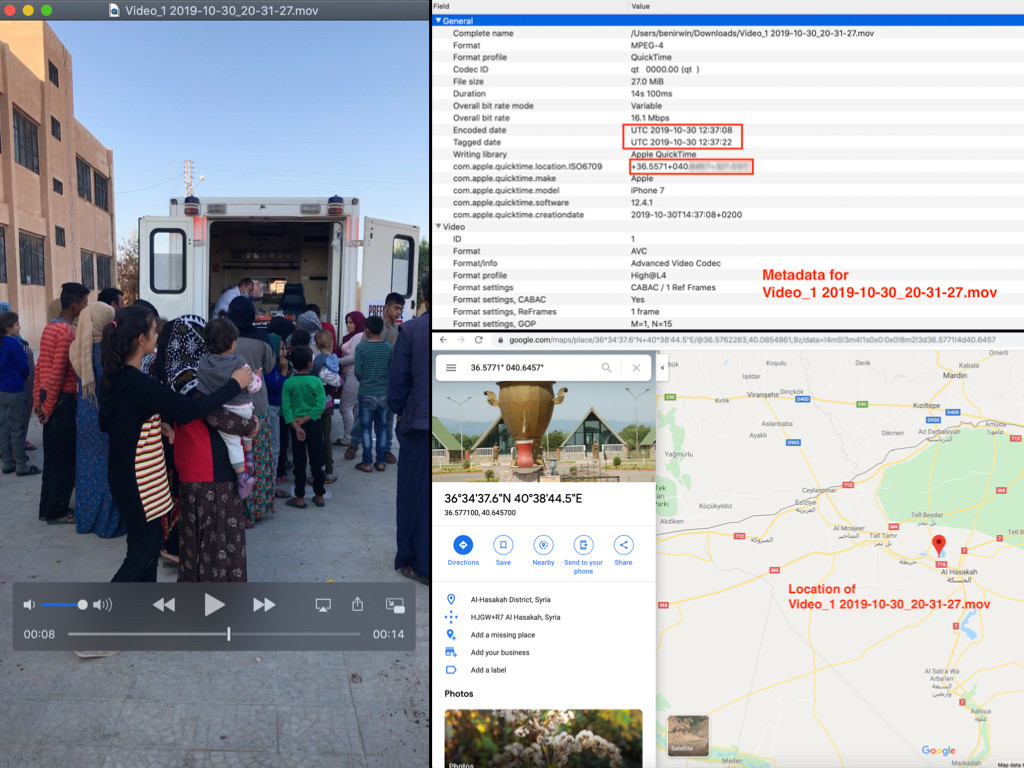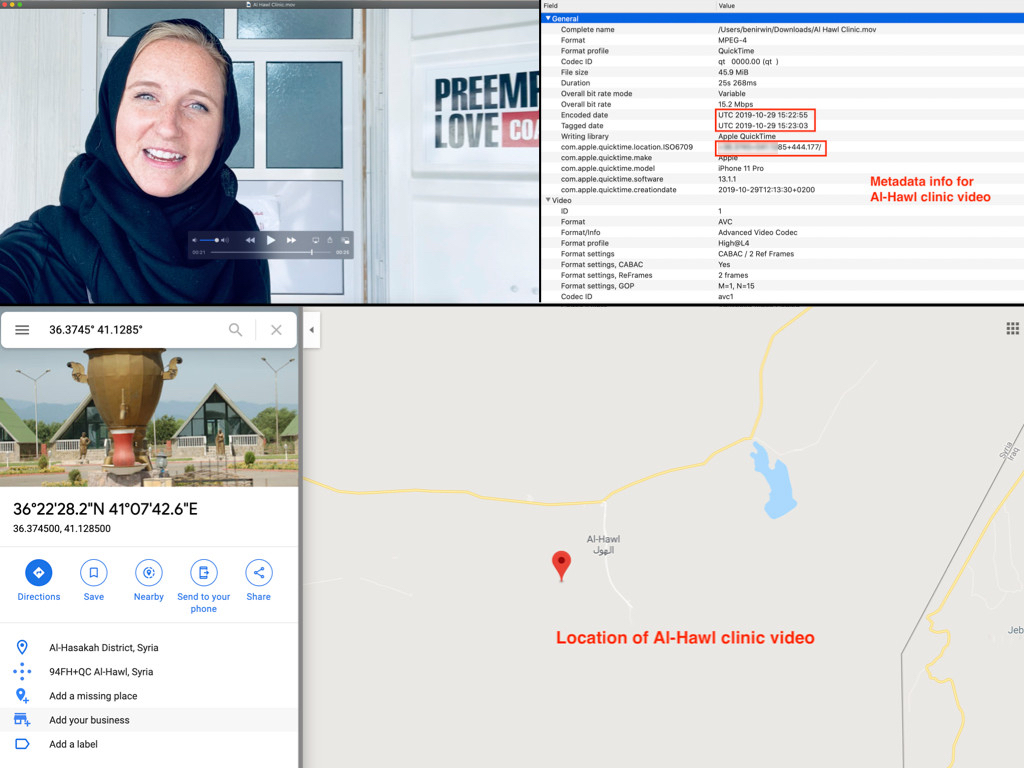Response to World Magazine’s Inquiry Into Our Work in Northeast Syria
On November 27, 2019, World Magazine informed us of plans to run a story scrutinizing our work in northeast Syria following the Turkish offensive that began in early October. In handful of communications prior to this, mostly via Twitter, they suggested we were orchestrating a “charade” and exaggerating or outright fabricating our work in Syria.
To be clear, at no point prior to November 27 did World explicitly request an interview with Preemptive Love. At no point prior to November 27 did they contact us through any of the normal channels for media inquiries, all of which are easily accessible through our website. At no point prior to November 27 did they inform us they were planning to run a story. On one occasion (November 20), they indicated they would send questions via email that same day—but no such email was received.
In their November 27 message, World at last provided a handful of questions for us to address. We are posting our responses to World publicly to ensure they are represented in their full, original context.
![]() “The Hasakah [Syria] regional office of humanitarian organizations has issued a formal complaint against [Preemptive Love] for publishing ‘fake numbers’ and ‘trading at the expense of the humanitarian situation.’ ”
“The Hasakah [Syria] regional office of humanitarian organizations has issued a formal complaint against [Preemptive Love] for publishing ‘fake numbers’ and ‘trading at the expense of the humanitarian situation.’ ”
—email dated November 27, 2019
You may be aware by now that neither the humanitarian affairs offices (HAO) in Hasakah or Amuda, Syria, nor the NES NGO Forum have issued any such complaint against Preemptive Love. Nor are they conducting an investigation into our work in northeast Syria, as you publicly alleged on Twitter on November 20.
They did raise entirely valid concerns about some mistakes we made in our messaging about the crisis in northeast Syria precipitated by the Turkish offensive. However, when we delivered a copy of the Failure Report to the HAOs in Hasakah and Amuda, acknowledging and correcting our mistakes, we were informed the matter had been dropped at both the provincial level in Hasakah and the regional level in Amuda, and that there was no further cause for concern.
“Fake numbers”
Regarding the allegation of “fake numbers,” we trust you realize this is a misrepresentation of what took place, attributing malicious intent to an honest mistake. We acknowledged our error in a Failure Report that we began working on November 7, seven days before you first contacted us.
As we shared in this report, we had mistakenly based our calculation on the number of families per shelter, rather than the number of individuals. There were, in fact, an average of 200 individuals at each shelter, not 200 families, as our comms team mistakenly thought when preparing an update. In an effort to approximate the number of displaced individuals, we multiplied 200 by 6 (the average household size in Syria) and then by 37 (the number of shelters), arriving at the number 44,400.
This is a standard formula that the UN and many organizations use to calculate the number of individuals when “head of household” data is all that is available. But in this case, we should not have multiplied by a factor of 6, because the number we had was already the number of individuals, not heads of household. The actual number of people sheltering at these locations as of October 30 was closer to 7,400.
As soon as we realized our mistake, we removed the number from our posts and issued a correction. Rather than burying the correction, we shared it in the most visible way possible—on our blog and social media channels. Our CEO Jeremy Courtney shared it on his personal Instagram and Twitter feeds as well.
“Trading at the expense of the humanitarian situation”
On November 20, in your second message via Twitter—and after we had replied to your first message—you leapt to describe our work in Syria as a “charade.” As you can probably understand, making such a serious accusation so quickly and before doing due diligence would give almost anyone pause before engaging further. It suggests you had already decided what the story should be, before the facts are clear.
The following morning, November 21, you indicated you would send followup questions by email that very day. No such email was received by anyone at Preemptive Love.

Six days later—the afternoon before Thanksgiving—you sent an email suggesting we are “trading at the expense of the humanitarian situation” and requesting a response while our entire US staff was away for the holiday, with their families.
We would like to take the opportunity to shed additional light on our work in northeast Syria from October to November 2019. To date, this work has included:
That’s in addition to millions of hot meals served across Syria since we began working there in late 2016, dozens of bombed-out homes repaired in Aleppo, hundreds of farmers return to their lands, and tens of thousands of medical consultations provided through our mobile clinics and portable hospital.
We’ve continued to maintain our presence in Syria, even as global interest has waned. Our staff and local partners have survived sniper fire and suicide bombings—just like you have—in order to reach those in need. On what grounds do you think it’s fair for us to be accused of “trading at the expense of the humanitarian situation”?
![]() We would also like to answer the specific questions you raised in your November 27 email.
We would also like to answer the specific questions you raised in your November 27 email.
“Who are the ‘local partners’ Jeremy [Courtney] has referenced that you are working with in northeast Syria?”
Since the early days of our presence in Syria, we have openly shared that we work with and through local partners. We design, implement, and monitor programming together, with Preemptive Love staff working alongside partners whenever possible.
But we do not publicly name our partners, out of the highest concern for their security and ours—and for our ability to operate freely in the most volatile parts of Syria and Iraq.
As confirmed to us recently by the NGO Forum Coordinator for northeast Syria, this is a standard, necessary practice followed by other aid groups, including at least one organization that World has covered favorably in recent weeks.
In a country as fractured and as militarily and politically complex as Syria, this is a matter of life and death. We work with people from all sides of the conflict in Syria. We work with people of opposing ideologies, political affiliations, and sectarian identities.
Let’s say we name our partners as you insist. Imagine, then, that our work takes us into one part of Syria where some of our partners are automatically viewed as the enemy, because they’re from the “wrong” part of the country or affiliated with the “wrong” people. All it takes is one quick Google search at one security checkpoint—and lives of our staff and local partners are in immediate danger.
This is not a hypothetical situation for us. This is the reality we have navigated since we first began working in Syria. If we name our partners to satisfy your demands, then you have substantially increased the risk to our staff and partners serving in some of the most volatile places in Syria.
If, despite the risk to our collective security, you insist that we start revealing our local partners—at the very least, we trust you will apply the same standard across the board, to all organizations you report on, and not play favorites.
“Where are the 37 schools located where you are serving, and what is the correct number of people being served?”
To be clear, we did not misrepresent the number of people we have served. We mistakenly reported the total number of people taking shelter at these 37 locations—a mistake we have since corrected.
Here are the locations where we worked with our partners to provide ready-to-eat food packages in October and early November:
Here are the locations where we worked with our partners to provide food and medical care in October and early November:
See above for the number of people who are receiving food packages, medical consultations, bed rolls, and winter survival kits.
Since you raised the possibility that we are orchestrating a “charade” in your Twitter message on November 20, it’s worth noting that we can prove exactly where we work in north and eastern Syria (and all Syria, for that matter) by extracting GPS coordinates from the metadata of videos we’ve made while on location.
[EDITOR’S NOTE: We have edited the images below since sharing them with World to partially blur the exact GPS coordinates, out of concern for our team’s security. World received un-blurred copies showing our exact coordinates.]


“Do you have ongoing work at Al-Hawl camp?”
In April 2019, we delivered a hospitainer (a shipping container outfitted as a customizable, portable medical clinic) that’s being used by another organization as a surgical unit and pre-op room for the field hospital at Al Hawl. We funded the structure; they are funding its operation.
We’re also funding a mobile clinic, doctors, and medicine to provide care to foreign wives and children of ISIS fighters, although the deteriorating security situation has limited our access in recent weeks. When the doctors we’re employing are unable to access this part of the camp, they are serving in the nearby field hospital. The mobile clinic has been deployed to shelters across north and eastern Syria. (It is one of the two mobile clinics currently serving the 37 locations mentioned above.)
Preemptive Love international program and communication staff have repeatedly been onsite to monitor and evaluate programming in Al Hawl, and to explore ways of establishing an ongoing presence there. The deteriorating security situation has forced us to revisit our timetable for realizing our full programming vision in Al Hawl. In the meantime, the doctors we are funding are continuing to provide care at the field hospital. The statement we made on November 6 remains accurate: “We’re working on how to meet the needs of residents. We’re pursuing ways to provide crucial medical care and food, and to provide care for the youngest and most impressionable, these children of ISIS families.”
![]() We are proud of our work in Syria. We are proud of what our donors have made possible. We are proud of our local staff and partners who bring this work to life. We are proud of our international staff who have pressed into the hard places to help others.
We are proud of our work in Syria. We are proud of what our donors have made possible. We are proud of our local staff and partners who bring this work to life. We are proud of our international staff who have pressed into the hard places to help others.
We are happy to answer any other questions you may have.